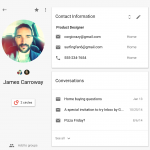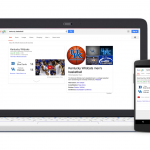Apple, Microsoft and Google need just one mobile improvement -- battery life

Let’s face it, you’ve picked the mobile operating system you like. Whether you’ve opted for an iPhone, a Lumia handset or a device running Android, the chances are you’re not going to switch allegiances no matter what others may do or say to try to convince you otherwise. At the same time, few people would argue that their handset of choice is perfect.
You’ve picked your side when it comes to OS, but what about the handset itself? Apple, Samsung, HTC et al keep releasing slightly tweaked versions of last year’s handset, perhaps adding a faster processor, a larger screen and more memory. One thing is constantly overlooked, however -- battery life. And it’s time for things to change.
Google finally gets around to revamping Contacts, but not without complicating things in the process

Compared to other Google products, Contacts feels like an afterthought. Since its introduction, it has received little attention, as the search giant focused on its more prominent and more promising services. Do you remember the last time an update was announced? I sure don't. It's still as ugly, awkward to use and slow as you've always remembered it to be.
But not for long. Google has announced that Contacts will finally get its much-needed revamp, showcasing the improvements via a preview that's available now. The new Contacts features some pretty big changes, starting with a look that feels modern enough for a Google product unveiled in 2015.
What the FREAK? Huge SSL security flaw stems from US government backdoor

Seven hours is all it takes to crack the encryption that is in place on some supposedly secure websites. Security experts blame the US government's ban on the use of strong encryption back in the 1990s for a vulnerability that has just come to light. Named FREAK (Factoring attack on RSA-EXPORT Keys), the flaw exists on high-profile websites including, ironically, NSA.gov.
Restrictions that limited security to just 512-bit encryptions were lifted in the late 90s, but not before it was baked into software that is still in use today. The ban on the shipping of software with stronger encryption apparently backfired as it found its way back into the States. Security experts say the problem is serious, and the vulnerability is relatively easy to exploit.
Google reneges on its promise of encryption by default for Lollipop devices

Not wanting to be outdone by Apple, when it was announced that iOS 8 would encrypt data by default, Google felt compelled to follow suit. Back in September Google said that in Lollipop "encryption will be enabled by default out of the box, so you won't even have to think about turning it on". But six months is a long time, and it now seems that Google has had a change of heart.
Well, as noted by Ars Technica, many of the Lollipop handsets appearing at MWC 2015 -- including the Samsung Galaxy S6 -- do not have encryption enabled. Of course there is nothing to stop users from manually enabling it, but that's not really the point; the idea was that you "won't even have to think about turning it on". So what gives?
YouTube gets a case of March Madness as NCAA tournament approaches

March Madness is almost upon us. For those outside the US this may sound a bit weird -- almost like what people claim to happen during a full moon. In truth it's actually more mundane, though many folks may argue that point. It's the college basketball tournament that culminates in the crowning of a school as the new national champion. It's the time of year when even non-gamblers lay down money and fill out brackets.
Can you watch it online? Well, sort of. A special YouTube channel is being set up to bring you some of the action. The selections for participation will be made March 15th and the games get underway on the 17th. The grand finale actually supersedes the month, with a championship game played on April 6th.
Apple Pay security scam nets fraudsters millions of dollars

The big names in tech are falling over themselves to get new payment systems out of the door at the moment. At MWC, Sundar Pichai confirmed Android Pay is on its way, and we've also learned about Samsung Pay from the Barcelona event. The convenience of paying with a smartphone is undeniable, but there are unavoidable security concerns.
Having been adopted by millions of Americans -- and with plans to expand into Europe and beyond -- Apple Pay is serving to highlight important security problems. Lax verification systems used by banks coupled with criminals exploiting stolen credit cards and IDs mean Apple Pay is used to make millions of dollars worth of fraudulent purchases. So how does it work?
7 useful online tools for your business

As the manager of a small business or an entrepreneur just starting out, you should always be on the lookout for anything that can improve your productivity, time management, organization, and ultimately make day to day tasks easier to manage.
It can be hard enough trying to run things in the office without also having to worry about your online presence. But like it or not, today’s business needs an online presence in order to ultimately succeed, or at least remain competitive.
Zip through the Amazon without any possible dangers to life and limb

The rainforests of the Amazon can be an inherently dangerous place, with everything from poison dart frogs to flesh eating fish. The Earth itself can be a dangerous place, more so in some locations than others, though it can be argued that only the types of dangers change. With that said, who wouldn't want to explore this pristine, and disappearing, area of the world?
Google Maps Street View can take you on that dream vacation and it's doing so in style -- a zip line to be precise. But this time you don't have all those dangers to worry about.
Google+ to split into Hangouts, Photos, and Streams

It's fair to say that of all of the social networks there are to choose from, Google+ is one that has failed to set the world on fire. Facebook may annoy users from time to time but it dominates the social web, and Twitter has carved out a healthy niche for itself as well. But Google is, uncharacteristically, unwilling to give up on Google+ just yet.
In what seems to be an attempt to breathe new life into a flagging product line, Vice President of Google, Bradley Horowitz is taking control. Interestingly he is not looking after Google+ as a whole, just a couple of its branches. Announcing the news, he said that the recent rumors surrounding Google+ splitting up are true.
Google, mobile and the next billion

The change in Google's narrative over the past few months has been very interesting to watch. The recent "Peak Google" proclamations remind me of Facebook's post-IPO narrative in 2012. Conventional wisdom back then was that Facebook's decline was imminent as mobile was not a meaningful part of their revenue. Of course, Facebook's app install ads and other mobile initiatives disproved that narrative in short order.
Some observers even make it seem as though Google's growth has seen a major slowdown in 2014. Interestingly, both Google's revenue and operating profit growth accelerated in 2014. This isn't to say that mobile does not pose a challenge to Google. It does, but it is important to understand exactly what those challenges are and the way forward. By looking at Google's financial reports, their biggest challenge is a decline in operating margins. This has been triggered by increase in search advertising on mobile, which delivers lower CPCs. While consumers used search on PCs for more involved research on products/services, the interaction window for mobile search is shorter. Lower ad engagement led to fewer bids on keywords and consequently, lower CPCs and margins.
Google will allow sexual content on Blogger after all
Google cheapens Android Play Store -- sells top app search spots to highest bidder

Not everything has to be monetized. In business, the goal is profits, true, but that is not the sole reason for existence. The money is earned by the hard work of employees, and relationships built with customers. If you have no customers, you have no profits -- never forget that. If a company takes advantage of customer trust and the overall relationship, the customers may become fatigued to the practices.
This brings us to Google. It is a company that is near and dear to our hearts. The world is a better place because of the search giant and its offerings. With that said, the company and its founders have become wealthy thanks to its customers. Those customers give Google access to their lives in exchange for free Gmail, Maps and more -- it is a contract between both parties. Today, Google crosses a line, creating fatigue by inserting ads into Play Store search results. It is a straw on our collective backs.
Google aims to secure enterprise BYOD with Android for Work

Android has successfully secured its place as the most used mobile operating system. With this in mind it should come as little surprise that more and more people are bringing Android devices into the workplace -- and for IT departments this can be something of a security nightmare. Today Google announces Android for Work with the aim of grabbing the BYOD (Bring Your Own Device) market and making Android more secure and manageable in the workplace.
What does this mean? Work profiles are being introduced to keep business apps and data separate from each other, so employees can use a single device to manage their personal work life. For both employer and employee this brings a number of advantages.
Google REALLY wants you to see ads -- Adwords automatically converts Flash to HTML5

Advertisements make the world go around. I understand they can sometimes be unpopular on the web, but using ad-blocking software is counter-productive, as it can harm the site that you are visiting. True, some ads can be intrusive and inappropriate (depending on the site), but they can be good too, as they educate you on new products. If there were no ads on TV, the radio or the Internet, how would you learn about new products on the market? Sometimes I don't even fast-forward on my Tivo, so I can learn about new products.
Today, Google announces that Adwords will be automatically converting Adobe Flash-based advertisements to HTML5. This will increase visibility of the ads, especially on mobile platforms where Flash is very rarely used nowadays.
Google's Pwnium V to last forever and offer unlimited money rewards -- get rich, y'all!

Paying developers and users for discovering security vulnerabilities has become rather commonplace. You know what? Good. Why shouldn't the "average Joe" have the opportunity to earn some cheddar in exchange for making software more secure? It's a win / win proposition.
Every year, Google announces the annual Pwnium event, in which people have one day to show off a Chrome browser or Chrome OS exploit and get money. The problem? Limiting this activity to one day per year limits the opportunity. In other words, why not pay people all year long for discovering exploits? Well, Google is doing exactly that; Pwnium V will last forever and offer unlimited money rewards. Ready to get rich?
Recent Headlines
BetaNews, your source for breaking tech news, reviews, and in-depth reporting since 1998.
© 1998-2025 BetaNews, Inc. All Rights Reserved. About Us - Privacy Policy - Cookie Policy - Sitemap.
